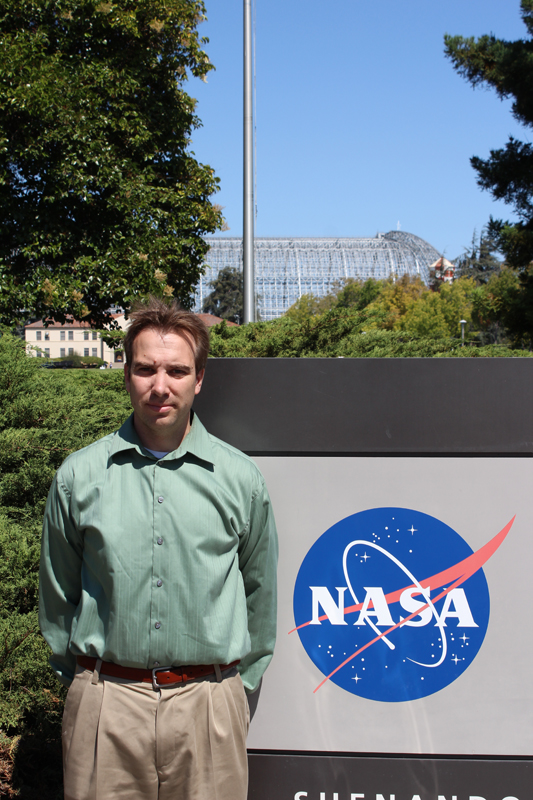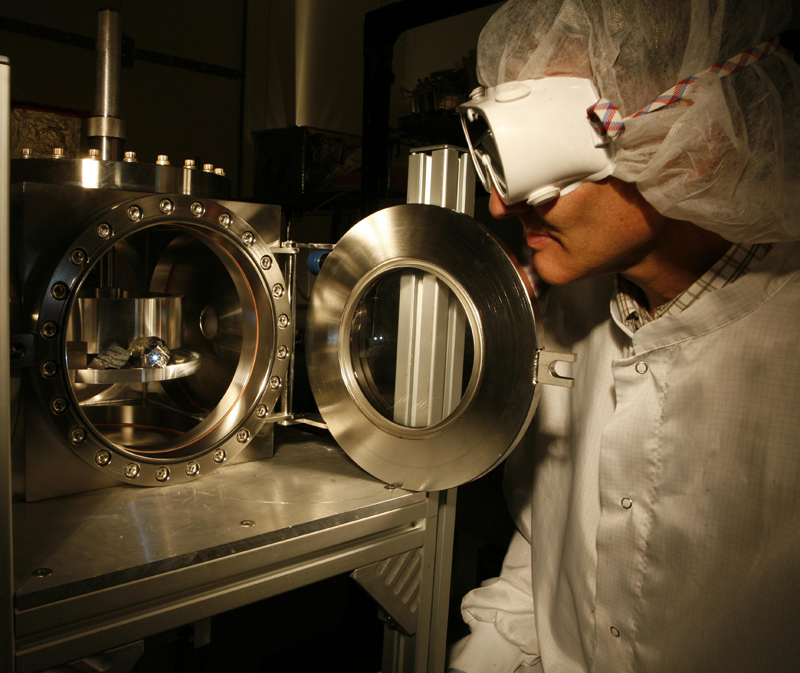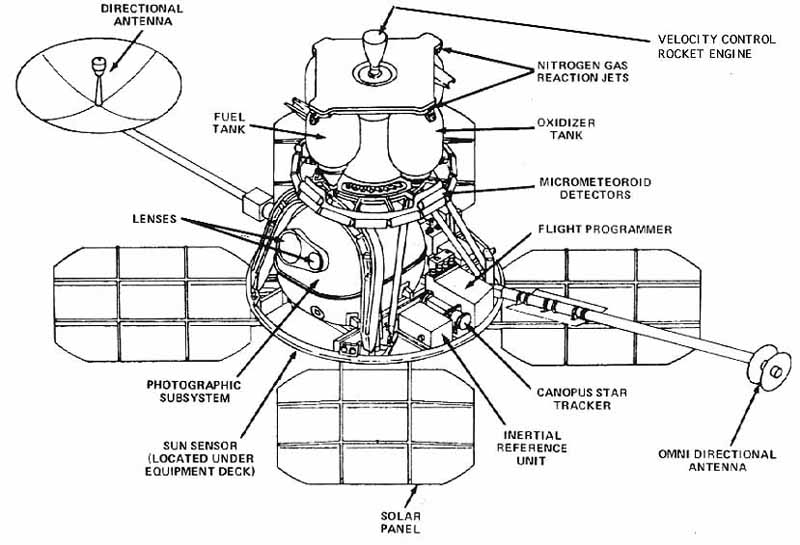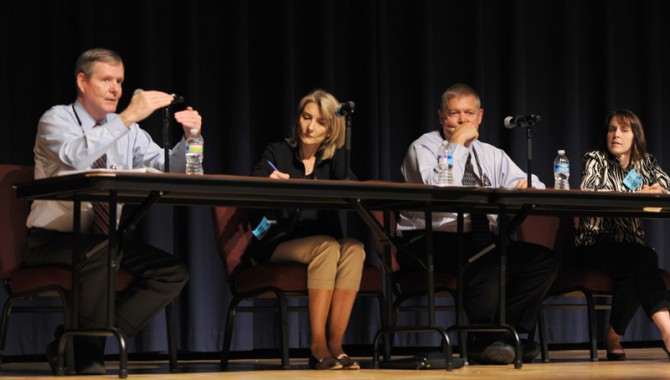
(Left to right) Bryan O’Connor, Amy Edmondson, Mike Ryschkewitsch, and Robin Dillon share insight into organizational silence on a panel at Goddard Space Flight Center on July 31, 2012. Photo Credit: NASA/Goddard Space Flight Center
August 30, 2012 Vol. 5, Issue 8
“How do we create a culture where the most important thing is to share the expertise and the wisdom that we have?” Ed Hoffman asked the audience at the Goddard Organizational Silence Forum in July.
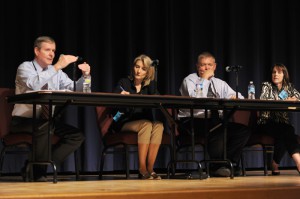
(Left to right) Bryan O’Connor, Amy Edmondson, Mike Ryschkewitsch, and Robin Dillon share insight into organizational silence on a panel at Goddard Space Flight Center on July 31, 2012.
Photo Credit: NASA/Goddard Space Flight Center
There are different forms of silence. Goddard Space Flight Center Director Chris Scolese recalled that when he first became a manager, “They took my ‘engineer’ card away.” Things changed. “It’s another form of silence,” he said. “People don’t talk to you the same way they used to.” Intimidation and other dynamics also come into play. “How do we get around that?” He said that it was important for forums like the Organizational Silence event at Goddard to discuss the issue and maintain awareness of the agency-wide dissenting opinion process.
“If there are things that we do well, let’s talk about them,” said Hoffman, NASA Chief Knowledge Officer and Director of the Academy of Program/Project & Engineering Leadership. “If there are things that we need to do better, let’s talk about them.”
When Bryan O’Connor, former NASA Chief of Safety and Mission Assurance, first arrived at Johnson Space Center in 1980, he recalled seeing the words “In God we trust. All others bring data,” written on a wall. He remarked on how this affected him. “If I have an opinion, they won’t listen to me. If I bring data, they will,” he remembers thinking. How do you build credibility to have your opinion heard if you lack data?
“It’s hard to bring data about human issues,” said one audience member. When it comes to leadership and management issues, the uncertainty is high and it is difficult to find ways to overcome the hesitation to voice an issue. “How can we overcome that and get over the fear factor?”
“That’s a tough question,” said O’Connor. He recounted his experience during safety school. The first six weeks was “engineering stuff,” he explained. What makes wings come off? How do you investigate an accident? The last four weeks were a different story. The course focused on the human element, which was significantly more complex and uncertain. (Watch video of Bryan O’Connor speaking on this topic.) “A little bit of humility can grease the situation,” he said. Acknowledging that you might not have all the data can help temper a sensitive situation. Challenging the value of ideas and not the value of people is also an important distinction to make.
NASA Chief Engineer Mike Rsychkewitsch built off O’Connor’s remarks emphasizing the need to build personal credibility. “You want the [right] reputation at the right time,” he said, emphasizing the importance of adopting a positive tone and offering suggestions. Im worried about so-and-so. They have done x, y, and z, and normally I wouldnt be worried about it, but this isnt normally how they behave.
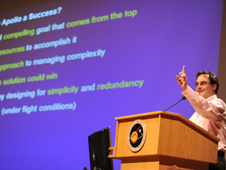
Andrew Chaikin, space author and historian, discussed the role of project management during Apollo during the Organizational Silence event at Goddard Space Flight Center on July 31, 2012.
Photo Credit: NASA/Goddard Space Flight Center
O’Connor recalled sitting in meetings when he first joined the agency and hearing people talk past one another. In the wake of Challenger, he promised himself that he would never let that happen again. He noted that simply saying, “I’m sorry, I heard two different things come from people who seem to think they are agreeing with one another. Can we go over that again?” can make all the difference.
Amy Edmondson, professor at the Harvard Business School, called this action “speaking up effectively,” which requires a balance of advocacy and inquiry. Edmondson, who studies organizational dynamics related to people withholding information rather than sharing it, discussed how not feeling entirely comfortable in their organization can be a hindrance to achieving the mission of an organization successfully.
In the end, it comes down to leadership and setting an example. “If the leader is sitting there and checking emails, then that’s what others will take to be the precedent,” said Robin Dillon, professor at Georgetown University. “It’s not enough to just pause,” she said. “You’ve got to go around and ask for concerns. What are we missing?”
“This is what I think you’ve told me and this is the conclusion I draw from it,” Ryschkewitsch said. “Did I hear what you intended to say? Sometimes simply asking that question offers the group that one last chance.
The Organizational Silence event featured a number of speakers including Andrew Chaikin, space author and historian, Marsha Coleman-Adebayo, author of the book No Fear, which covers her experience with organizational silence at the Environmental Protection Agency; a Goddard panel featuring Judy Bruner, Director of Safety and Mission Assurance, George Morrow, Director of the Flight Projects Directorate, Dennis Andrucyk, Director of Applied Engineering & Technology Directorate, and Ron Brade, Director of the Office of Human Capital Management.
Learn more about the Goddard Organizational Silence event.






